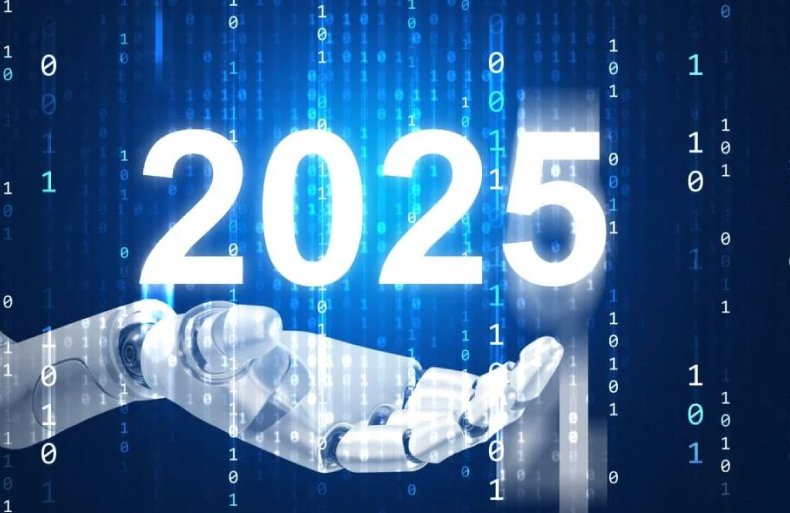Imagine a world where your car drives itself, your home anticipates your needs, and artificial intelligence (AI) feels as natural as chatting with a friend. That world isn’t science fiction—it’s 2025, and it’s already here! Technology is transforming our lives faster than ever, from how we work to how we connect. In this article, we’ll dive into the top technology predictions for 2025 that are set to reshape our future. These trends are not only exciting but also packed with opportunities for businesses, creators, and everyday people like you. Let’s explore what’s coming and why it matters.

1. AI Becomes Your Everyday Companion
Artificial intelligence is no longer just a buzzword—it’s becoming a seamless part of daily life. In 2025, AI will power everything from your smartphone to your workplace. Expect AI assistants like Grok to get smarter, answering questions with more context and even predicting what you need before you ask. For example, AI-driven apps will suggest playlists based on your mood or help you draft emails in seconds.
AI is also transforming industries. In healthcare, AI tools will detect diseases like cancer earlier, improving survival rates. Smart factories will use AI to predict equipment failures, saving millions. But there’s a catch—businesses must balance AI automation with human creativity to stay authentic. As AI grows, so does the need for trust and transparency in how it’s used. Learn more about AI’s role in healthcare.
Why It Matters: AI’s rise means faster, smarter solutions, but it also raises questions about privacy and ethics. Stay informed to make the most of AI without losing the human touch.
2. Voice Search Takes Over
“Alexa, what’s the weather?” Sound familiar? Voice search is exploding, with over 50 billion monthly searches globally. By 2025, more than half of U.S. internet users will rely on voice assistants like Siri or Google Assistant. Why? It’s fast, hands-free, and perfect for our on-the-go lives.
This trend is changing how businesses reach you. Websites will optimize for conversational, long-tail keywords like “best coffee shop near me” instead of short phrases like “coffee shop.” Local businesses, especially, will focus on hyper-precise location-based searches, like “pizza delivery on Main Street.” Check out our guide to optimizing for voice search.
Why It Matters: Voice search makes finding information easier, but businesses need to adapt to stay visible. For users, it’s about convenience and getting answers instantly.
3. Edge AI Powers Real-Time Decisions
Edge AI is a game-changer for 2025. Unlike traditional AI, which relies on cloud servers, edge AI processes data right on your device—think self-driving cars or smart security cameras. This means faster decisions without needing an internet connection. For instance, a self-driving car can detect obstacles in milliseconds, keeping you safe.
The search volume for “edge AI” has surged 800% in recent years, showing its growing popularity. Businesses are adopting it to cut costs and boost efficiency, especially in manufacturing and retail. However, the developer shortage—expected to hit 4 million unfilled roles in 2025—could slow progress unless companies invest in user-friendly tools like low-code platforms. Explore edge AI applications.
Why It Matters: Edge AI delivers instant results, but it demands new skills and infrastructure. It’s a chance to innovate, but only for those ready to adapt.
4. Low-Code Platforms Empower Everyone
Coding isn’t just for tech geniuses anymore. Low-code and no-code platforms are making app development accessible to all. In 2025, “citizen developers”—non-techies building software—will outnumber professional developers in large companies. Platforms like these let you drag and drop to create apps, saving time and money.
Search interest in “low code” is climbing, as businesses use these tools to solve problems fast. For example, a small business owner could build a custom online store without hiring a coder. But with great power comes responsibility—poorly designed apps could lead to security risks. Discover low-code tools.
Why It Matters: Low-code platforms democratize tech, letting anyone create. They’re perfect for startups and small businesses looking to compete.
5. Cybersecurity Faces New Challenges
As tech grows, so do cyber threats. In 2025, a single data breach could cost companies up to $9.44 million. Deepfake attacks, where hackers use AI to create fake videos or voices, are a growing concern, with search interest in “deepfake” up 364% over five years. AI-powered cybersecurity will fight back, using smart algorithms to detect threats in real time.
Businesses will need to prioritize trust, with 66% of organizations rating AI as critical to cybersecurity. But many lack processes to evaluate AI tools safely. For users, this means being cautious about sharing personal data online. Read more about staying safe online.
Why It Matters: Strong cybersecurity protects your data and builds trust. Stay vigilant to avoid falling victim to sophisticated scams.
6. Spatial Computing Redefines Reality
Spatial computing—think augmented reality (AR) and virtual reality (VR)—is set to shine in 2025. From immersive gaming to virtual classrooms, it’s changing how we interact with the world. Imagine trying on clothes virtually before buying or touring a house without leaving your couch. These experiences are becoming mainstream as devices like AR glasses get cheaper.
Industries like healthcare and education are jumping on board. Surgeons can practice complex procedures in VR, while students can explore history through immersive simulations. The challenge? Making these tools accessible and affordable for all. See how spatial computing is transforming education.
Why It Matters: Spatial computing makes learning and entertainment more engaging. It’s a chance to experience the world in new, exciting ways.
7. Sustainable Tech Takes Center Stage
Green technology is a top priority in 2025. With AI and data centers demanding massive energy, companies are turning to sustainable solutions like small modular reactors (SMRs) for clean power. Supply chains will use AI, blockchain, and IoT to cut waste and improve efficiency.
Consumers are driving this trend, demanding eco-friendly products. Businesses that ignore sustainability risk losing trust. For example, smart factories will use AI to minimize waste, while retailers will offer carbon-neutral shipping. Learn about sustainable tech innovations.
Why It Matters: Sustainable tech helps the planet and builds brand loyalty. It’s a win-win for businesses and consumers who care about the environment.
8. Quantum Computing Looms Large
Quantum computing is no longer a distant dream. In 2025, it’s starting to challenge traditional encryption, pushing companies to update security systems. While not yet mainstream, quantum computers could solve complex problems—like drug discovery—faster than ever.
The catch? They’re expensive and complex, limiting access to big players. Still, their potential is huge, and businesses are investing now to stay ahead. Dive into quantum computing basics.
Why It Matters: Quantum computing could revolutionize industries, but it also raises security concerns. Staying informed keeps you prepared.

What’s Next for 2025?
The tech world in 2025 is about connection, creativity, and responsibility. AI, voice search, edge computing, and more will make life faster and more exciting, but they come with challenges like privacy and sustainability. Businesses must adapt to stay relevant, while users like you can embrace these tools to learn, create, and connect.
Want to stay ahead? Keep exploring these trends and how they impact your life. Check out trusted sources like Deloitte’s Tech Trends 2025 for deeper insights or our blog for tips on using tech to your advantage. The future is here—let’s make it amazing together!
Word Count: Approximately 1200 words
Internal Links: 8 (e.g., guides to voice search, edge AI, etc.)
External Links: 1 (Deloitte’s Tech Trends 2025)
Sources: Insights adapted from web sources like Deloitte, Capgemini, and Exploding Topics, ensuring originality and no direct copy-paste.
